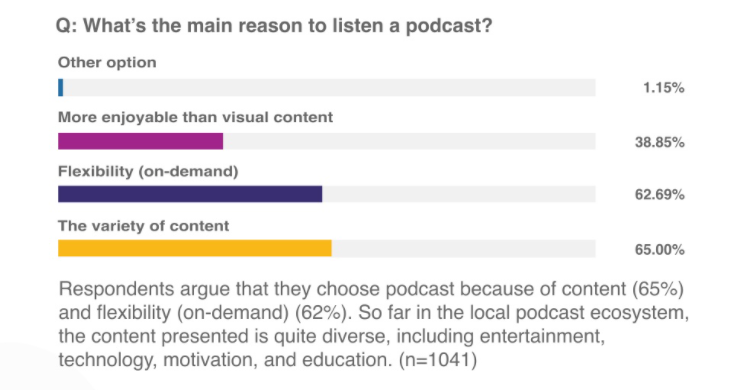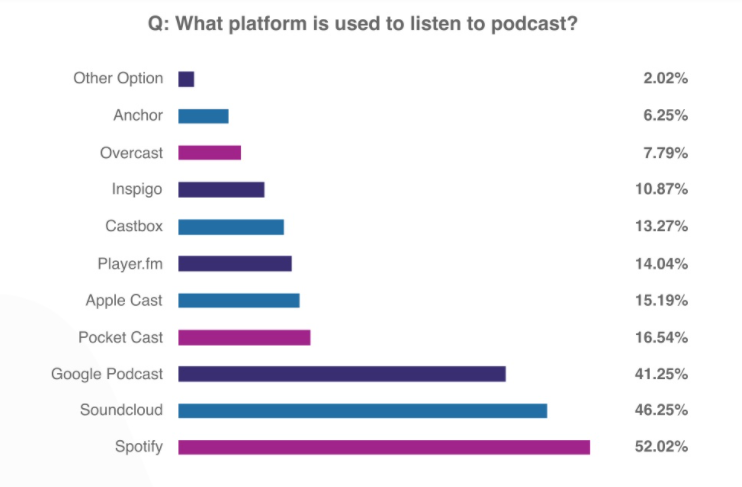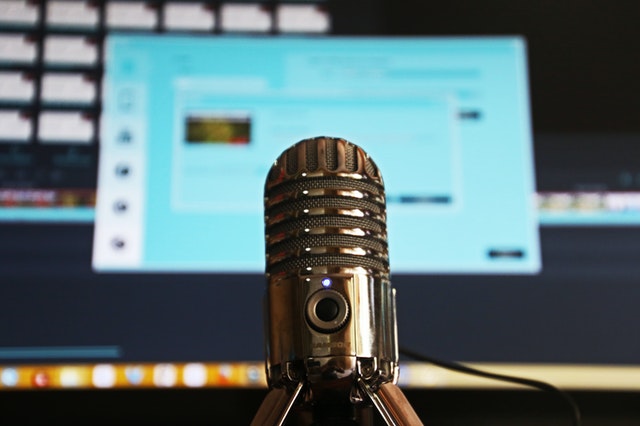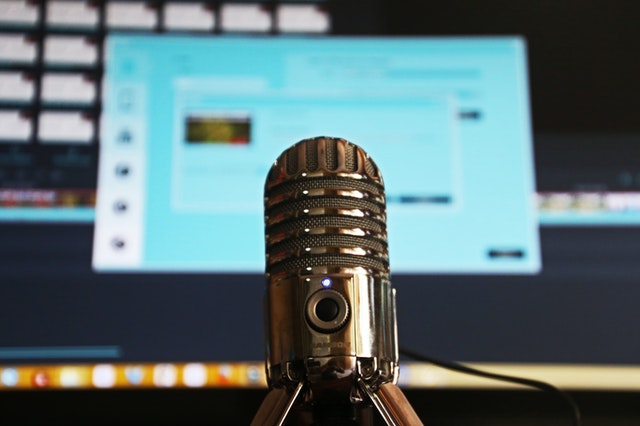Voice-based content has existed before the internet, through the radio. As technology advanced, now voice-based content has evolved into on-demand content accessible through platforms.
One of those is the podcast or web podcast, which has become popular in recent years. Podcasts are serialized sound-based content that can be downloaded on your device. The term podcast or a combination of the words “iPod” and “broadcasting” was born along with the birth of this Apple device in 2001. Referring to Podcast Hosting data, there are 1.75 million podcast broadcasts in the world with 43 million episodes as of February 2021.
Now, voice-based content is transformed into on-demand content and available on various platforms, such as Apple Podcast, Spotify, Google Play Music, and Anchor. Not only on-demand, but the audio-based platforms Clubhouse is also gaining popularity among users in Indonesia.
Clubhouse is actually an audio-chat-based social media application that allows users to discuss various topics with other users. Exclusively, this application is to deliver a podcast format, but live. Then, how is the Indonesian market’s acknowledgment of voice-based content?
Podcast to lead the media landscape
Based on the information from several sources, there are some reasons why podcast is dominating the media landscape in a few countries, including Indonesia. First, podcast comes in a format that allows listeners to do other activities or multitask. This situation is different while enjoying video, e-book, or image based content,
In terms of consumers, this format is considered fine to take up their busy lives. The diversity of podcasts have the ability to build a community with the same preferences.
These factors are considered relevant for the Indonesian market. Referring to Podcast User Research in Indonesia in 2018, content variation and flexibility are two big reasons why consumers listen to this digital-based audio content.

In addition, the smartphone’s existence is one of the driving factors why podcasts have paved the way from specialized media to become mainstream media. What we know is that podcast content is only available in certain media, such as iPods, media players, and desktops/laptops.
According to Grand View Research, low storage space, internet connection, and the limited media to access podcasts at that time hindered the growth of this industry. Now, smartphones with high-bandwidth internet connections are starting to empower the industry.
Trend of local podcast platform
The global podcast market value is estimated at $9.28 billion in 2019 and is predicted to reach $11.7 billion in 2020 according to Grand View Research data. In Indonesia, the number of content and listeners is still dominated by foreign platforms, such as Spotify and Google Podcast.
At least, this refers to Podcast User Research in Indonesia data in 2018, where Spotify (52.02%) was recorded as the most popular platform for podcast. However, Inspigo is actually included as the only local player in the top 10.

This indicates the development of the local podcast platform awareness. The podcast growth trend in Indonesia has also encouraged a number of business players to develop similar platforms, such as Noice and PodMe.
Inspigo was launched in October 2017, but the platform was released to the public in April 2018. Meanwhile, Inspigo offers various packaged audio content, ranging from on-demand content, talk shows, and interactive sessions.
Meanwhile, Noice was launched in 2018 under PT Mahaka Radio Digital, a joint venture company formed by PT Mahaka Radio Integra Tbk (MARI) and PT Quatro Kreasi Indonesia. Quatro is a consortium of four recording companies in Indonesia, including Musica, Aquarius, My Music, and Trinity.
Finally, PodMe was developed by a media conglomerate, the Media Group. The PodMe platform was released in October 2019 and offers a number of on-demand audio content, such as comedy, business, and the Kick Andy program.
Mahaka Radio’s President Director, Adrian Syarkawie revealed that Noice, which was originally developed as a streaming radio platform, was deemed insufficient to meet the growing market needs. In fact, on-demand content is considered to be growing rapidly in a number of countries, including Indonesia.
“If only from streaming radio alone, it seems [lacking] for digital applications. Moreover, people can still hear radio from other media. So, we are looking forward to what will be attractive to consumers through this application, and so we enter the podcast content, “he said to DailySocial.
In addition, on-demand audio content is getting highlighted by investors as an interesting digital business trend in the future. For example, Kopi Kenangan’s CEO and Co-founder, Edward Tirtanata, who recently announced as an angel investor through his fund, Kenangan Kapital, is reportedly going to invest in one of the local podcast platforms.
Although it is yet to be confirmed, Edward had mentioned in an interview with DailySocial that Indonesia demands more disruption in the consumer tech segment. In his observation, the products/services of this segment are still underrated in terms of technology.
Monetization hitch
Regardless, in any format, on-demand content will always lead to one big challenge, on how to monetize the business model. In general, on-demand content relies on two schemes, advertising and subscription systems.
The second option is quite attractive for platform providers to gain revenue. As long as customers can see/enjoy the value provided, they will continue to pay. Unfortunately, this option is considered difficult for the Indonesian market with a lack of willingness to pay.
Even Spotify, which has gone public, has to make a bet on making podcast content as its way to profitability. Referring to Spotify data in Indonesia, this strategy is actually make sense.
Spotify spotted that Indonesia is dominating podcast consumption in Southeast Asia in 2020. Around 20% of the total Spotify users in Indonesia listen to podcasts every month, and this number is higher than the global average percentage.
Spotify’s Head of Studios for Southeast Asia, Carl Zuzarte said that Indonesian podcast listeners have their own characteristics, the majority like content to listen to at night before bed. The consumption rate has increased in recent months, especially during the PSBB.
Meanwhile, in terms of podcasters, Box2Box ID’s Co-founder, Tio Prasetyo , also acknowledged the challenges of monetization. He said, podcasters still rely on revenue from brand-sponsored content. In this case, clients generally have an entire episode broadcast for their own promotion, similar to radio.
“The difference is, compared to radio, we can provide more accurate data, such as the number of listeners in real-time and reach to clients,” Utomo said as quoted from krAsia.
Utomo said podcasters are to raise additional income with other models, such as speaking at offline events or distributing broadcast material on podcast platforms for paid campaigns.
–
Original article is in Indonesian, translated by Kristin Siagian

